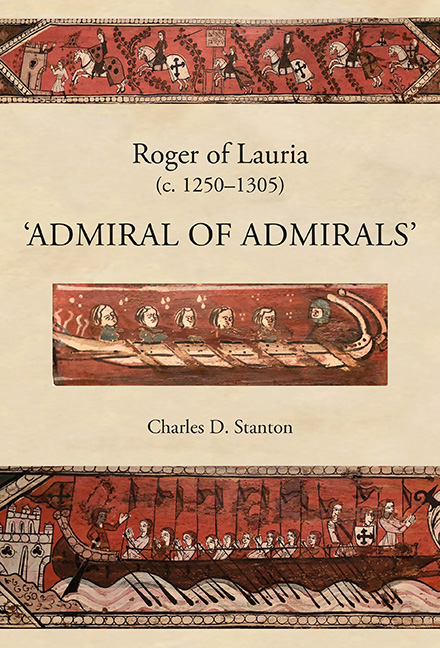Book contents
- Frontmatter
- Dedication
- Contents
- List of Illustrations
- Prologue
- 1 Battle of Benevento (26 February 1266)
- 2 A Calabrian Exile in the Court of Aragon (1262–1282)
- 3 Battle of Tagliacozzo (23 August 1268)
- 4 Aragonese Expansion (1229–1282)
- 5 Angevin Consolidation and Aggrandizement (1268–1282)
- 6 Revolt of the Vespers (30 March 1282)
- 7 Aragonese Intervention (August–October 1282)
- 8 Stalemate (November 1282–March 1283)
- 9 Admiral of Aragon (20 April 1283)
- 10 The Opposing Fleets (1282–1302)
- 11 Battle of Malta (8 June 1283)
- 12 Anjou's Dreams of Empire Dashed (June–November 1284)
- 13 France's Crusade Against Aragon (May–November 1285)
- 14 Battle of the Counts (23 June 1287)
- 15 Truces and Treaties (June 1287–November 1291)
- 16 Raid on Romania (Summer 1292)
- 17 Switching Sides (December 1293–April 1297)
- 18 Aragon's Invasion of Sicily at Anjou's Bidding (1298/1299)
- 19 Lauria's Last Great Campaign (Summer 1299–Spring 1300)
- 20 Endgame (Spring 1301–Summer 1302)
- Epilogue
- Bibliography
- Index
16 - Raid on Romania (Summer 1292)
Published online by Cambridge University Press: 24 October 2019
- Frontmatter
- Dedication
- Contents
- List of Illustrations
- Prologue
- 1 Battle of Benevento (26 February 1266)
- 2 A Calabrian Exile in the Court of Aragon (1262–1282)
- 3 Battle of Tagliacozzo (23 August 1268)
- 4 Aragonese Expansion (1229–1282)
- 5 Angevin Consolidation and Aggrandizement (1268–1282)
- 6 Revolt of the Vespers (30 March 1282)
- 7 Aragonese Intervention (August–October 1282)
- 8 Stalemate (November 1282–March 1283)
- 9 Admiral of Aragon (20 April 1283)
- 10 The Opposing Fleets (1282–1302)
- 11 Battle of Malta (8 June 1283)
- 12 Anjou's Dreams of Empire Dashed (June–November 1284)
- 13 France's Crusade Against Aragon (May–November 1285)
- 14 Battle of the Counts (23 June 1287)
- 15 Truces and Treaties (June 1287–November 1291)
- 16 Raid on Romania (Summer 1292)
- 17 Switching Sides (December 1293–April 1297)
- 18 Aragon's Invasion of Sicily at Anjou's Bidding (1298/1299)
- 19 Lauria's Last Great Campaign (Summer 1299–Spring 1300)
- 20 Endgame (Spring 1301–Summer 1302)
- Epilogue
- Bibliography
- Index
Summary
THE COLLAPSE OF THE PEACE process did not, of course, immediately precipitate a new round of fighting or invite a fresh invasion of Sicily. First of all, as a practical consideration, there was no possibility of mounting a successful amphibious assault on a large island in the middle of the Mediterranean without a substantial maritime capability and, at this juncture – thanks to Aragonese naval prowess under Roger of Lauria – the Angevins and their allies possessed nearly none. Charles II of the Regno attempted to effect a temporary remedy by seeking a contract with Genoa for a fleet of some sixty ships in early 1291, but the Aragonese under Frederick of Sicily, the younger brother of James and Alfonso, torpedoed the overture by threatening the Genoese with trade sanctions and a guerre de course waged by his feared admiral, if they should stray from their previously professed neutrality.
The underlying cause for the continued hiatus, however, was quite simply war weariness. The conflict had already dragged on for nearly a decade, accompanied by a deleterious drain in money and manpower for all concerned. Moreover, a number of distractions – foreign and domestic – plagued each of the parties, the most significant of which was the final fall of the Latin Kingdom of Jerusalem. Acre, the last great Christian bastion in Palestine, was vanquished by the Mamluks on 18 May 1291 – followed within a month by the ports of Beirut, Tyre and Sidon. As a consequence, Pope Nicholas IV became consumed with mounting a papally sanctioned expedition to liberate the Latin Kingdom. The great military powers of contemporary Christianity understood, however, that such a crusade would be futile without some sort of foothold in the Levant – apart from Cyprus. The pope died disappointed and dispirited on 4 April 1292 in Rome. The aspiration of rescuing Acre and the few remaining Christian ports on the coast of Syria was also what had motivated Edward I of England to promote peace in Western Europe. With that incentive now gone, Edward soon fell out with Philip IV of France over Gascony, England's last remaining continental possession – for which the English crown still paid homage to the French king. Contemporaneously, Charles the Lame was more concerned with shoring up Angevin authority on the Italian peninsula than reclaiming rule over Sicily.
- Type
- Chapter
- Information
- Roger of Lauria (c.1250–1305)‘Admiral of Admirals’, pp. 223 - 235Publisher: Boydell & BrewerPrint publication year: 2019



